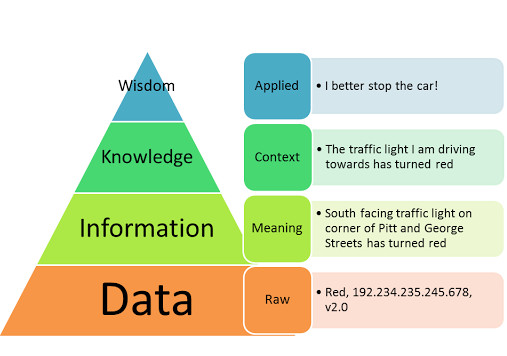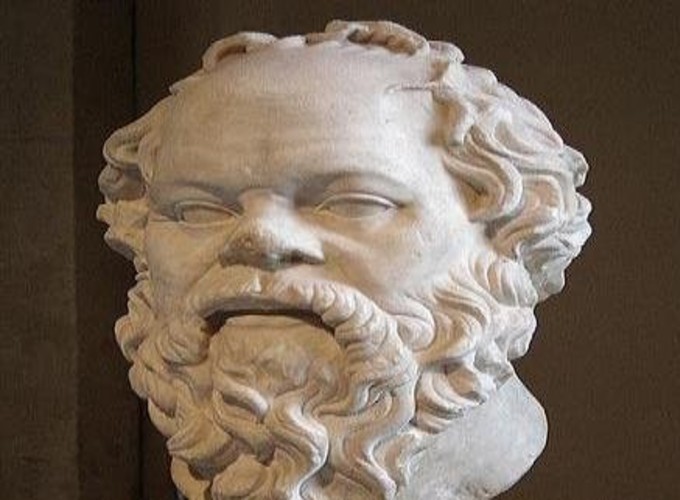Table of Contents
Introduction
Perhaps there is not a better phrase to start this post than the Socratic paradox,
This is typical of the great gap that exists between Eastern and Western way of thinking about fundamental concepts such as information, knowledge and wisdom. In my opinion we have become too ignorant and arrogant boasting about our knowledge that we cannot even understand the basics of it. This is all too evident in Information/Computer Science fields. The well-known Data-Information-Knowledge-Wisdom (DIKW) pyramid has become a popular shorthand representation for the data to information to knowledge to wisdom transformation. As a result of this we, the information/computer scientists, often hear about knowledge representation and inference, knowledge extraction, knowledge management and knowledge organization.

Data-Information-Knowledge-Wisdom
The Problem
This mechanized perception and realization of knowledge can easily lead people to believe that machines can become wise and they can become wise too by following this transformation process. The main appeal to this common belief is that we are completely ignorant on how these words, i.e. information, knowledge and wisdom were defined and used in the past by our ancestors. Most important is the fact that we have replaced their meaning and definition with other words that are inferior and subservient as symbols. An example of this phenomenon is the definition of the word information. Inform comes from the Latin verb informare, which literally means to give form, or to form an idea of. Where the ancient and modern Greek word for information is πληροφορία, which transliterates (plērophoria) from πλήρης (plērēs) “fully” and φέρω (phorein) frequentative of (pherein) to carry through1. You may realize how different becomes your thinking by using one or the other definition of the word and perhaps how narrow is your thinking if you are missing completely the older ancient Greek definition of the word information. But this was the subject of a previous post of mine.
About Knowledge
In this post we focus on knowledge. How do we define knowledge ? According to Stanford Encyclopedia of Philosophy:
it is common in epistemology to distinguish among three kinds of knowledge. There’s the kind of knowledge you have when it is truly said of you that you know how to do something—say, ride a bicycle. There’s the kind of knowledge you have when it is truly said of you that you know a person—say, your best friend. And there’s the kind of knowledge you have when it is truly said of you that you know that some fact is true
The Know-How is how you know
The first definition of knowledge, i.e. the know-how, is most evident in our learning process. It is about acquiring knowledge through practicing and experiencing the difficulties and different situations that may arise. If you want to become, let’s say a neurosurgeon, reading books, watching videos and attending classes in a medical school is not going to make you a neurosurgeon. If you do not have hands-on practical training on a operating room with your colleagues, under the supervision of an experienced neurosurgeon, it is most probable that you are going to kill your first patient. Learning to perform a surgery simply means you know how to do it. Wikipedia definition on knowledge is very enlightening: “knowledge is a familiarity, awareness or understanding of someone or something, such as facts, information, descriptions, or skills, which is acquired through experience or education by perceiving, discovering, or learning”. Therefore, it seems we are are paying too much attention and we emphasize the awareness and understanding of facts and information part instead of focusing on the experience, education and learning part. Thus we are only informed about things, such as processes, events, organizations, people, but deeply inside we do not know anything about them, i.e. know how is how you know.
The “I know something or someone” phrase
How you know him or this or that ? Most often we mean that it just happens, by coincidence, to meet him once in person, or we heard about something, or we read about this or that. And especially for people, I am sure that many of you think that they know someone well, until it comes the day you understand how wrong you are. This “know” perception of ours is what I was referring to as the inferior subservient purpose. This is also the case when information and computer scientists claim that they know how to extract or manage or organize knowledge. It just means they are capable of modeling, composing, structuring, storing, analyzing information in a clever way and they are simply aware of this fact. By analogy of our aforementioned statements information becomes degraded too. There is endless effort in our field on how to structure and model the data, i.e. what form to give the data, this is the core idea of information technology.
The “I know this is true” phrase
Information technology is about Database Management Systems and digital libraries of information (data), and about building clever tools to do statistics and predictions. Let me take another example. Today we are able to browse a huge “Knowledge Base” such as Wolfram Alpha and ask what is the distance of Moon from Earth, to receive the current result of 399383 kilometers. But do I know anything about that distance except this number figure ? Have I traveled that distance ? Have I measured that distance ? What is the source of information ? Is it authoritative ? Why is there such a distance and is it constant ? What purpose it serves ? These are typical question just to make you think that stating a fact is only the tip of the iceberg. Take another example, financial instability, let us assume we can predict such a phenomenon, does this mean we know anything about it ?
Epilogue
We think we know, we know nothing, and even those that are in the process of knowing something, eventually they admit that they are still learning about it. The more you know something, the more you understand how deep your knowledge about this thing can become. Famous soloists are aware of this process. They are rediscovering day by day more about the quality of sound they can produce with their instrument. But it is not any more about the technical know-how, it is about knowing how to express themselves through the instrument and feel more the music they play. In my opinion knowledge is a very deep process that takes place inside of us. It can assist you to your search for the path to wisdom, but it will not make you wiser. I believe wisdom is part of the spiritual endeavor. We are fools if we believe our knowledge, not to say our technology, makes us wiser than our ancestors. Wisdom is about how you lead your life, how you live your life and depends on the utmost goal you strive to achieve in this life. For such a reason Socrates was a wise man and he really meant that “All I know is that I know nothing”.
Cross-References
-
The ancient Greek origin of the word
information- Wikipedia Etymology section of the term Information was updated by HEALIS with the quoted text above on the 13th of June 2014 ↩︎
